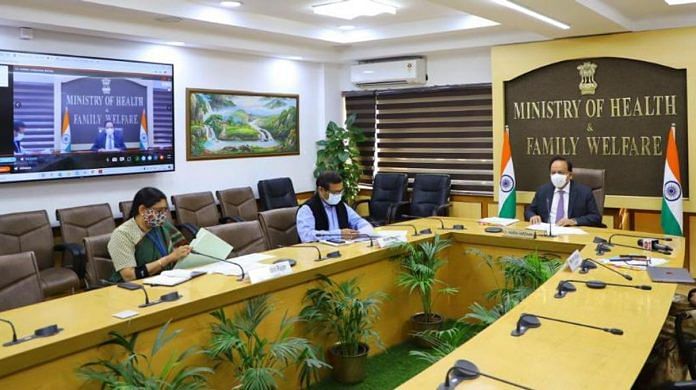New Delhi: India’s HIV prevention model can be adopted and scaled up in many countries by tailoring the targeted interventions programme as per local settings and can also be replicated in other prevention and disease control initiatives, Union Health Minister Harsh Vardhan said on Wednesday.
Addressing a ministerial meeting of the Global Prevention Coalition (GPC) for HIV Prevention through video conference, he acknowledged that global AIDS response has shown remarkable success in reducing new infections, improving access to prevention services for key population and treatment services for people living with HIV (PLHIV) and reducing AIDS-related mortality among others, the health ministry said in a statement.
Vardhan noted that the organisation has “shown to the world a model where multiple stakeholders can come together and work cohesively towards a common goal”.
Speaking on India’s unique HIV prevention model which is centred around the concept of ‘social contracting’ through which the targeted interventions (TI) programme is implemented, Vardhan said that with support from NGOs, the programme is aimed at providing outreach, service delivery, counselling and testing and ensuring linkages to HIV care.
“India’s prevention model can be adopted and scaled up in many countries by tailoring the intervention as per local settings. It can also be replicated in other prevention and disease control programmes,” he was quoted as saying in the statement.
Vardhan elaborated how India protected the gains made in HIV prevention during the COVID-19 pandemic.
“The government of India took swift and timely action by involving communities, civil society, development partners to reach out to the last mile with a robust implementation plan for ARV dispensation.
“The government also linked key populations and PLHIV to various social welfare schemes. Advisories and guidance notes were issued by NACO from time to time aligned with global guidelines in the context,” he said.
Also read: Daily cases and positivity rate rise as Covid-19 tests cross 9-lakh mark
The health minister apprised the audience how India had revamped its TI programme to focus on hard-to-reach populations to keep its commitments- people living in prisons and other closed settings were considered as priority populations and interventions launched were gradually scaled up since 2016; the HIV Counselling & Testing Services (HCTS), community based screening of HIV for improving early diagnosis were also ramped up.
He also apprised them about the coverage of testing for HIV across the country was increased to achieve the elimination of mother to child transmission of HIV.
He also added that under the Test and Treat Policy, approximately 50,000 PLHIV who were lost to follow-up were linked back to Anti-Retroviral Treatment services through ‘Mission SAMPARK’, while viral load testing facilities have been scaled up from the existing 10 public sector labs to 64 labs across the country.
In this regard, he also mentioned the enactment of The Human Immunodeficiency Virus and Acquired Immune Deficiency Syndrome (Prevention and Control) Act, 2017 which has provided a legal and enabling framework for safeguarding the human rights of the infected and affected populations.
Vardhan warned the various stakeholders of newer vulnerabilities and risks exacerbated by the pandemic that warrant a graded and coordinated response. He ended his speech by reiterating India’s commitment to achieve the 90-90-90 targets across the country by the end of the current year and also end the AIDS epidemic as a public health threat by 2030.
Hosted by UNAIDS and UNFPA on behalf of the Global HIV Prevention Coalition (GPC), the conference this year holds significance in achieving the 2016 UNGA commitment to end AIDS by 2030.
Member states of GPC had agreed to reduce new adult HIV infections by 75 per cent at the end of 2020 from 2010 levels.
Also read: 74% of Delhi residents want shutdown of markets, shops to contain Covid, survey finds



